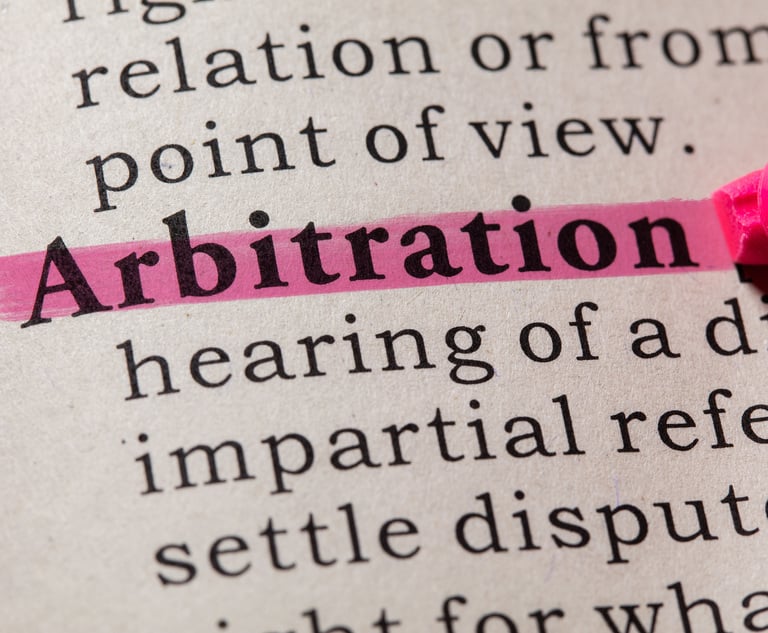 Credit: Feng Yu/Adobe Stock
Credit: Feng Yu/Adobe Stock Three's Company: Can a Nonsignatory to an Arbitration Agreement Compel or Be Compelled to Arbitrate?
"Courts in New Jersey ... emphasize strong public policy favoring arbitration to resolve disputes and require liberality in construing contracts in favor of arbitration," write Archer's Alexis M. Way and Marie E. Lihotz.
August 20, 2024 at 01:00 PM
8 minute read
The proliferation of arbitration agreements in consumer and business contracts presents challenges when a dispute, governed by an arbitration agreement, also involves claims against or advanced by a third party, who is not party to that arbitration agreement. Indeed, the Federal Arbitration Act enforces an arbitration agreement notwithstanding the presence of others who are parties to the underlying dispute but not the arbitration agreement. New Jersey's public policy applies similar tenets when reviewing matters governed by its Arbitration Act, noting N.J.S.A. 2A:23B-6, provides an agreement to arbitrate is "valid, enforceable, and irrevocable except upon a ground that exists at law or in equity for the revocation of a contract."
Consequently, courts often stay disposition of claims of nonsignatories pending the arbitration outcome, which not only increases costs—based on the need to litigate on two fronts—but also, extends ultimate finalization of disputes. Any comprehensive litigation plan must understand when and whether a third-party nonsignatory to an arbitration agreement may be compelled to join an arbitral disposition of disputes or, correspondingly, when a nonsignatory might be the driving force to require arbitration.
NOT FOR REPRINT
© 2025 ALM Global, LLC, All Rights Reserved. Request academic re-use from www.copyright.com. All other uses, submit a request to [email protected]. For more information visit Asset & Logo Licensing.
You Might Like
View All
Arbitrators Under Fire for Allegedly Forcing Workers to 'Stay or Pay' Employers
5 minute read
Dispute Resolution Boards—Getting Real Time Decisions on Construction Projects
7 minute read
Appreciating the Important Work the Middlesex County Civil Bar Panel Does
7 minute read
NJ Appellate Division Holds 'Clickwrap' Arbitration Provision Enforceable
5 minute readTrending Stories
- 1Reviewing Judge Merchan's Unconditional Discharge
- 2With New Civil Jury Selection Rule, Litigants Should Carefully Weigh Waiver Risks
- 3Young Lawyers Become Old(er) Lawyers
- 4Caught In the In Between: A Legal Roadmap for the Sandwich Generation
- 5Top 10 Developments, Lessons, and Reminders of 2024
Who Got The Work
J. Brugh Lower of Gibbons has entered an appearance for industrial equipment supplier Devco Corporation in a pending trademark infringement lawsuit. The suit, accusing the defendant of selling knock-off Graco products, was filed Dec. 18 in New Jersey District Court by Rivkin Radler on behalf of Graco Inc. and Graco Minnesota. The case, assigned to U.S. District Judge Zahid N. Quraishi, is 3:24-cv-11294, Graco Inc. et al v. Devco Corporation.
Who Got The Work
Rebecca Maller-Stein and Kent A. Yalowitz of Arnold & Porter Kaye Scholer have entered their appearances for Hanaco Venture Capital and its executives, Lior Prosor and David Frankel, in a pending securities lawsuit. The action, filed on Dec. 24 in New York Southern District Court by Zell, Aron & Co. on behalf of Goldeneye Advisors, accuses the defendants of negligently and fraudulently managing the plaintiff's $1 million investment. The case, assigned to U.S. District Judge Vernon S. Broderick, is 1:24-cv-09918, Goldeneye Advisors, LLC v. Hanaco Venture Capital, Ltd. et al.
Who Got The Work
Attorneys from A&O Shearman has stepped in as defense counsel for Toronto-Dominion Bank and other defendants in a pending securities class action. The suit, filed Dec. 11 in New York Southern District Court by Bleichmar Fonti & Auld, accuses the defendants of concealing the bank's 'pervasive' deficiencies in regards to its compliance with the Bank Secrecy Act and the quality of its anti-money laundering controls. The case, assigned to U.S. District Judge Arun Subramanian, is 1:24-cv-09445, Gonzalez v. The Toronto-Dominion Bank et al.
Who Got The Work
Crown Castle International, a Pennsylvania company providing shared communications infrastructure, has turned to Luke D. Wolf of Gordon Rees Scully Mansukhani to fend off a pending breach-of-contract lawsuit. The court action, filed Nov. 25 in Michigan Eastern District Court by Hooper Hathaway PC on behalf of The Town Residences LLC, accuses Crown Castle of failing to transfer approximately $30,000 in utility payments from T-Mobile in breach of a roof-top lease and assignment agreement. The case, assigned to U.S. District Judge Susan K. Declercq, is 2:24-cv-13131, The Town Residences LLC v. T-Mobile US, Inc. et al.
Who Got The Work
Wilfred P. Coronato and Daniel M. Schwartz of McCarter & English have stepped in as defense counsel to Electrolux Home Products Inc. in a pending product liability lawsuit. The court action, filed Nov. 26 in New York Eastern District Court by Poulos Lopiccolo PC and Nagel Rice LLP on behalf of David Stern, alleges that the defendant's refrigerators’ drawers and shelving repeatedly break and fall apart within months after purchase. The case, assigned to U.S. District Judge Joan M. Azrack, is 2:24-cv-08204, Stern v. Electrolux Home Products, Inc.
Featured Firms
Law Offices of Gary Martin Hays & Associates, P.C.
(470) 294-1674
Law Offices of Mark E. Salomone
(857) 444-6468
Smith & Hassler
(713) 739-1250






